Trace Lara Hentz (DeMeyer)
 |
| new UPDATED edition March 1, 2024 |
 |
| Author, at right |
 |
| THE COUNT 2024 |
WHAT JUST HAPPENED? Watch this👇
Trace's memoir One Small Sacrifice, Second Edition is BACK! Republished Oct. 11, 2022. AMAZON has the paperback and ebook. Ten years had passed since it was first published. You have to read it! Read the reviews on Amazon.
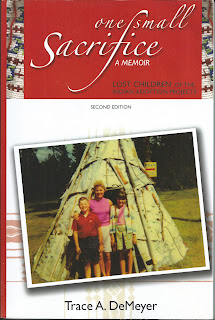 | |||
| $10.99 paperback, $3.99 ebook |
 |
| NEW 2022, free book on its own website |
HER WEBSITE: https://blog.tracehentz.com/
Trace
L. Hentz is former editor of the Pequot Times in Connecticut and
editor/co-founder of Ojibwe Akiing in Wisconsin. She worked as staff writer at
News From Indian Country 1996-1999. Her writing, interviews and poetry have
been published in newspapers and journals in the USA, Canada and Europe. She is
the founder of Blue Hand Books, a publishing collective she started for other
Native authors in 2011. She has been a panelist and presenter on the topic of
Indian Adoption at many universities in the U.S and Canada. A mix of American
Indian and French Canadian-Irish, Trace is a graduate
of the University of Wisconsin-Superior with a Bachelor of Fine Arts, and lives
in Greenfield her husband Herb, former GCC Director of Admission.
Known for her exceptional print interviews with Leonard Peltier, John Trudell and Floyd Red Crow Westerman, Trace Hentz (who legally dropped the name DeMeyer in 2014) started intensive research on adoptees in 2004. Her memoir ONE SMALL SACRIFICE was a ground-breaking exposé on the systematic removal of American Indian children from their mothers, families and tribes for adoption to non-Indian families while she weaves in her own personal story. Her adoptee journey takes her around the country, finally meeting her birthfather in 1994 and learning about her mixed ancestry (Anishinabe-Shawnee-French Canadian.) Trace is former editor of tribal newspapers the Pequot Times and Ojibwe Akiing. She has contributed to adoption anthologies: Lost Daughters, Adoption Reunion in the Age of Social Media, and Adoptionland: From Orphans to Activists. In 2013, she was co-editor of the anthology Unraveling the Spreading Cloth of Time: Indigenous Thoughts Concerning the Universe with MariJo Moore.
The blog American Indian Adoptees [https://blog.americanindianadoptees.com] ranks in the top 100 adoption blogs and has reached five million + views in 2025.
In 2017, Trace contributed poetry to Tending the Fire: Native Voices and Portraits.
Published on 4-20-16 (Book 3 in Lost Children of the Indian
Adoption Projects series)
When We Disappeared? One Small Sacrifice | GRIEF MEMOIR (after the plague) (2026 maybe)
Sleeps With Knives and Becoming (poetry, memoir)
5 part Book Series on Lost Children
She has also contributed to the following:
Adoption
Reunion in the Age of Social Media: Her Chapter: Finding
Earl
Lost Daughters anthology: Trace contributed a Chapter MENDING THE HOOP…Lost Daughters: Writing Adoption from a Place of Empowerment and Peace (anthology) The Lost Daughters anthology features a collection of writings aimed to bring readers the perspectives of adopted women and highlight their strength, resiliency, and wisdom. Amanda Woolston is the primary editor for this anthology was published through CQT Media and Publishing and LGA, Inc. in January 2014. [Kindle Edition].
Adoptionland: From Orphans to Activists [Ever wondered what it’s like to be adopted? This anthology begins with personal accounts and then shifts to a bird’s eye view on adoption from domestic, intercountry and transracial adoptees who are now adoptee rights activists. Along with adopted people, this collection also includes the voices of mothers and a father from the Baby Scoop Era, a modern-day mother who almost lost her child to adoption, and ends with the experience of an adoption investigator from Against Child Trafficking. These stories are usually abandoned by the very industry that professes to work for the “best interest of children,” “child protection,” and for families. However, according to adopted people who were scattered across nations as children, these represent typical human rights issues that have been ignored for too long. For many years, adopted people have just dealt with such matters alone, not knowing that all of us—as a community—have a great deal in common.]
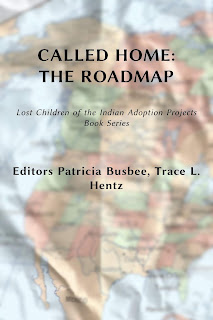 |
| LINK to buy |
Published in December 2017 - NEW
SECOND EDITION, updated
|
5
***** REVIEW: Unraveling the Spreading Cloth of Time: Indigenous Thoughts
Concerning the Universe
EARLY
REVIEWS:
“Unraveling
the Spreading Cloth of Time offers a very clear contrast between the Western science view
of the cosmos as an object for study -- something external to the scientists --
and the Native American view of each person being a participating part of a
dynamical, living web of connections. This anthology will be very useful in
opening up readers to a vision and experience of the Native American worldview,
which is presented expertly throughout the text as one of flux and change.”
- Dr. F. David Peat, Theoretical Physicist, founder of the Pari Center for
New Learning in Italy, and author of Blackfoot Physics and Science,
Order and Creativity (with David Bohm)
Read this review: www.prairiemary.blogspot.com
This is an interesting, at times compelling, collection of poems, stories, personal essays and declarations. They champion and reflect an understanding of the sacredness and inter-relatednesss of all life. These beliefs not that long ago were dismissed by mainstream American thinking as superstitious and primitive yet they resound with a deep sense of humility, respect and gratitude for all forms of life. The book is organised into five parts in and around the theme of indigenous traditions and understandings of the cosmos: the interconnectedness of all life; cosmologies of medicines and ceremonialism; prayers, dreams and visions; stories and weavings; and sacred spaces and spiritual energies. These at times are interlinked with commentaries about the theories of life emerging from the work of atomic physicists.It's a poetic and lyrical dance, a continual weaving and reweaving of the micro and macro.
Thus
Kim Shuck (Tsalagi) when she writes in her beautiful, moving piece `Tangled' in
Part Three that she `sings to the world rich with mystery with exploration', to
the `trickster state of being', and in particular, those deft lines about the
young girl, `small small mystery that she is, (who) doesn't know how to control
medicine, she only knows how to be a secret'.
Titles
themselves become immediate entry points of reverie, as in Lois Red Elk's
(D/Lakota) poem in Part One, `I am related to the Day', where the weather is
personalised as a relative in the rich interweaving of life. And in John D
Berry's (Cherokee/Choctaw) piece `Green Corn' in Part Two, where `Dawn's
Light/Prayers on the Wind' carries the ancestors into the future, the future
back into the present.
Time
is cyclical, seasonal, rhythmic, continuous.
We
see that most poignantly in Stephanie A. Sellers (Cherokee/Shawnee) wondrous
writing (in Part Three) about her father, who died on 12/12/12, the day of
planetary confluences boding the end of one epoch, the beginning of another.
Her father `who spent every living hour/governed by the turning of the sun' returning
home to the world of spirit on a mid-winter's day. It's a beautiful, sublime
piece reminding us of the continual process of becoming, returning, re-coming.
As
MariJo Moore (Cherokee) writes in her introduction to Part Three: dance,
speech, prayer are not just things said or done; they are experienced.
Similarly,
Mary Black Bonnet (Lakota) in Lel U Kunpi Kin Cante Mawaste (Because we are
here, my heart is good) dances and sings with her daughter, not just doing
those actions, but being them, being singing, being dancing. `I dance', she
writes, `to honor my journey from my people (when I was adopted by non-natives)
and my journey back to my people'. And that dance, that going forth and
returning, she shows, embodies, is, celebration.
Trace A. DeMeyer (Anishinaabe/Shawnee) when she tells us in her "Four
Souls" in Part Two: `Our purpose here is to "create", not just
live' and that are `Our souls exist to journey, to experience, to give thanks'.
This
is also a book of recovery, of remembering, of piecing together that which has
been fragmented, dissipated, overwhelmed by centuries of repression, genocide,
alienation, separation.
Carole
W. Bachofner's (Abenaki) adroit, powerful question (and answer) in her poem We
Speak the White Man's Language in Part Three : Where did the language go when
the black robes/threw holy water on it? Did it disappear/when the switch was on
our backs? Into the trees/into the streams, into our wombs to wait' - are words
of an inextinguishable faith. Or Kim Shuck when she exalts: I am singing
connection to a wildly entangled world.Prayer, words, ceremony not only help
create a world of beauty and medicine, they are medicine, they are, in Carole W
Bachofner's inimitable words, when honoured, when spoken and lived truly, a
`clearing, a place for fire'.
Just
as too, Denise Low (Delaware/Cherokee), in exploring the power of words,
reminds us `a breathed word is a living being', that life and landscape are
textured with language, so that `migration stories are journeys of geography
and...the soul'.
Everything
is alive, everything is storied. `We are story stones', MariJo Moore writes in
her introduction to Part Four, `on which sacred carvings are added daily'.
Such
words are celebrations, such celebrations and stories pathways to the sacred,
to sacred places and sacred spaces. These in turn are repositories of memories,
knowledge and, in Vine Deloria Jr's (Standing Rock Sioux) carefully woven words
in Part Five, The Spiritual Universe, speak of - and are - relationship,
connection.
Unraveling
the Spreading Cloth of Time is a book one can read as a whole or in parts and
return to, dip into, like bathing in a clear stream. Often it's the small, deft
details that evoke the humanity of writers such as Stephanie A Sellers, where
sparse descriptions give us space, allow us to fill in the details the way that
dappled sun ripples into leaves, revealing their veins.
Trace's book One Small Sacrifice and Blue Hand Books is mentioned on page 40! REALLY Nice! ((New issue of Shelf Unbound))
Click
on this link to start reading your new issue right now:
In this issue:
Street
Photographer Vivian Maier, discovered
Geek
Mythology
Renaissance
Reads
Boy
Scout Stuff
MTV's
Glory Days
Interview
with Thomas Steinbeck
Poetry, Book Club Find, Short Stories,
and More
SHE blogs:
BOOK
TRAILER: http://youtu.be/EmCT4vnWjbI
****************
BOOK SERIES: It's A Miracle We Survived this Far (creative non-fiction)
 |
| this book is truly unique (2018) |
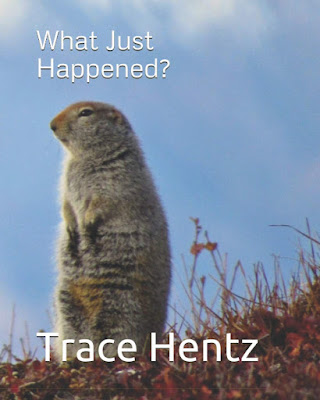 |
| BRAND SPANKIN' NEW in 2021 |



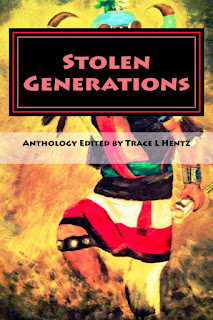
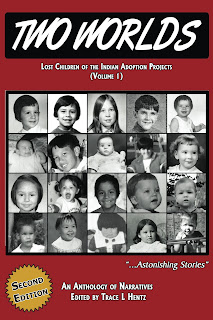
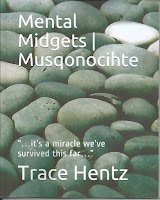
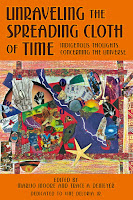



Comments
Post a Comment
please leave a comment and we'll get back to you